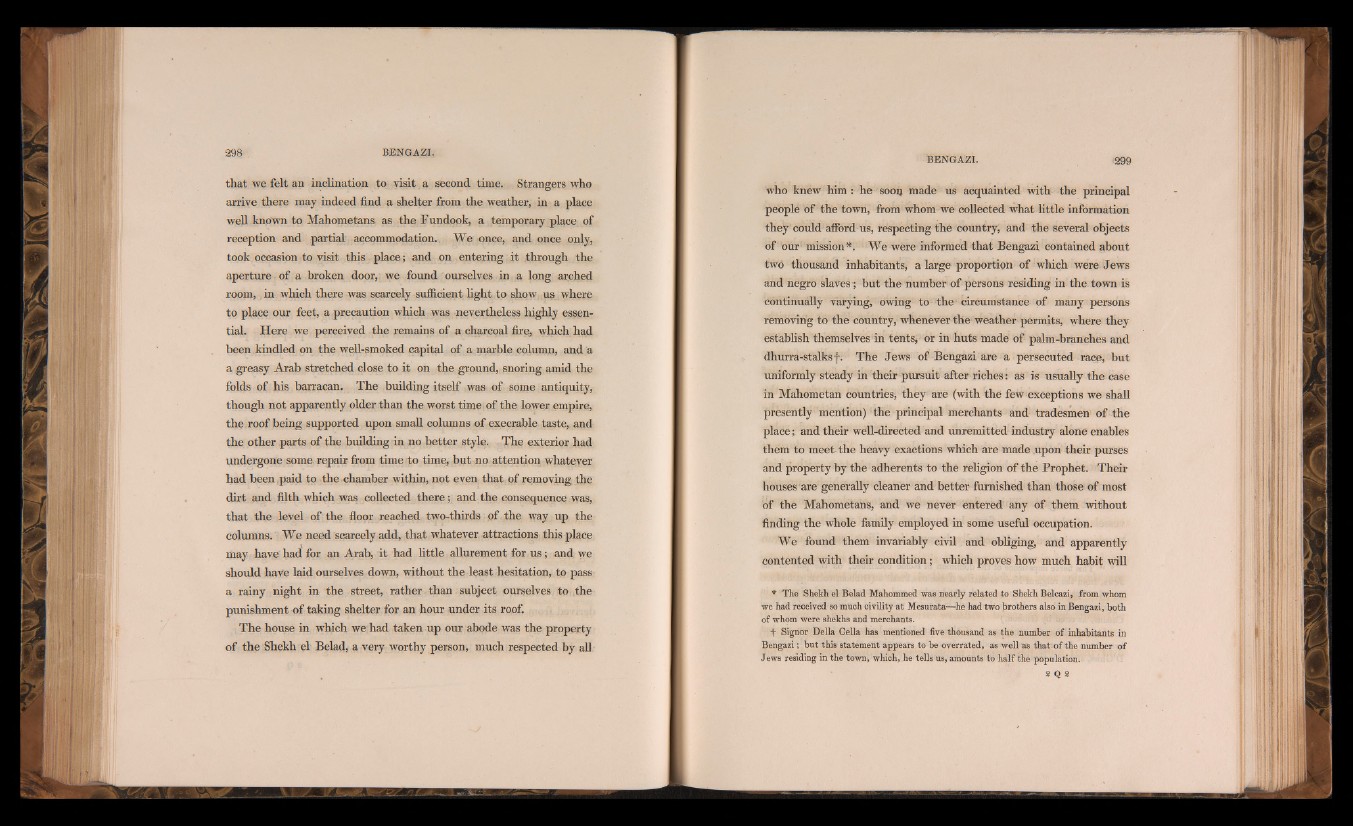
that we felt an inclination to visit a second time. Strangers who
arrive there may indeed find a shelter from the weather, in a place
well known to Mahometans as the F undook, a temporary place of
reception and partial accommodation.. We once, and once only,
took occasion to visit this place; and on entering it through the
aperture of a broken door, we found ourselves in a long arched
room, in which there was scarcely sufficient fight to show us where
to place our feet, a precaution which was nevertheless highly essential.
Here we perceived the remains of a charcoal fire, which had
been kindled on the well-smoked capital of a marble column, and a
a greasy Arab stretched close to it on the ground, snoring amid the
folds of his barracan. The building itself was of some antiquity,
though not apparently older than the worst time of the lower empire,
the roof being supported upon small columns of execrable taste, and
the other parts of the building in no better style. The exterior had
undergone some repair from time to time, but no attention whatever
had been paid to the chamber within, not even that of removing the
dirt and filth which was collected there; and the consequence was,
that the level of the floor reached two-thirds of the way up the
columns. We need scarcely add, that whatever, attractions this place
may have had for an Arab, it had little allurement for u s ; and we
should have laid ourselves down, without the least hesitation, to pass
a rainy night in the street, rather than subject ourselves to the
punishment of taking shelter for an hour under its roof.
The house in which we had taken up our abode was the property
of the Shekh el Belad, a very worthy person, much respected by all
who knew him : he soon made us acquainted with the principal
people of the town, from whom we collected what little information
they 'could afford us, respecting the country, and the Several objects
of our' mission*. We were informed that Bengazi contained about
two thousand inhabitants, a large proportion of which were Jews
and negro slaves ; but the number of persons residing in the town is
Continually varying, owing to-the ■ circumstance of many persons
removing to the country, whenever the weather permits, where they
establish themselves in tents,- or in huts made of palm-branches and
dhurra-stalksf. The Jews of Bengazi are a persecuted race, but
uniformly steady in their pursuit after riches: as is usually the case
in Mahometan countries; they: are (with thé few exceptions we shall
presently mention) the principal merchants and tradesmen of the
place ; and their well-directed and unremitted industry alone enables
them to meet the heavy exactions which are made upon their purses
and property by the adherents to the religion of the Prophet. Their
houses are generally cleaner and better furnished than those of most
of the Mahometans, and we never entered any of them without
finding the whole family employed in some useful occupation.
We found them invariably civil and obliging, and apparently
contented with their condition ; which proves how much habit will
* The Shekh el Belad Mahommed was nearly related to Shekh Belcazi, from whom
we had received so much civility at Mesurata—he had two brothers also in Bengazi, both
of whom were shekhs and merchants.
+ Signor Della Celia has mentioned five thousand as the number of inhabitants in
Bengazi ; but this statement appears to be overrated, as well as that' of the number of
Jews residing in the town, which, he tells us, amounts to half the population;
2 Q 2